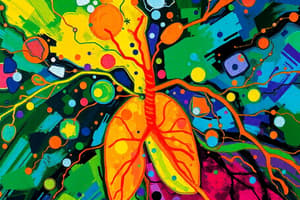Podcast
Questions and Answers
Which process yields the highest amount of ATP?
Which process yields the highest amount of ATP?
- Aerobic respiration (correct)
- Photosynthetic respiration
- Anaerobic respiration
- Anoxic respiration
In which type of respiration does oxygen get released during daylight and consumed at night?
In which type of respiration does oxygen get released during daylight and consumed at night?
- Photosynthetic respiration (correct)
- Aerobic respiration
- Anaerobic respiration
- Anoxic respiration
Which process occurs in the absence of oxygen but yields less ATP than aerobic respiration?
Which process occurs in the absence of oxygen but yields less ATP than aerobic respiration?
- Anaerobic respiration (correct)
- Aerobic respiration
- Anoxic respiration
- Photosynthetic respiration
Where does the Electron Transport Chain (ETC) occur?
Where does the Electron Transport Chain (ETC) occur?
What is the final phase of respiration where ATP is synthesized from ADP and inorganic phosphate?
What is the final phase of respiration where ATP is synthesized from ADP and inorganic phosphate?
Flashcards are hidden until you start studying
Study Notes
Science: Exploring Life through Biology and Respiration
Life is a complex, diverse, and ever-evolving phenomenon. As scientists delve into the mysteries of existence, the field of biology stands at the forefront of our understanding of living organisms. One of the fundamental processes that underpin all life forms is respiration, the cyclical exchange of matter and energy between an organism and its environment. In this exploration of science, we'll travel through the world of biology, particularly focusing on the fascinating dynamics of respiration in organisms.
Biology: The Study of Life
Biology is the scientific discipline that investigates living organisms, their characteristics, behavior, interactions, and evolutionary history. It encompasses a broad range of topics, including the study of cells, molecules, genes, and ecosystems. The field of biology is inherently interdisciplinary, as it combines aspects of chemistry, physics, mathematics, and ecology to provide a comprehensive understanding of life.
Respiration: The Essence of Life
Respiration is the process by which organisms obtain energy from nutrients and convert it into a form that can be used for cellular functions. This process involves the following steps:
- Glycolysis: The first phase of respiration, where glucose molecules are broken down to produce energy in the form of ATP (adenosine triphosphate).
- Citric Acid Cycle (or Krebs Cycle): A series of chemical reactions that release additional energy from the products of glycolysis.
- Electron Transport Chain (ETC): Occurring in the mitochondria, the ETC generates ATP by harnessing the energy from transferred electrons.
- Oxidative phosphorylation: The final phase of respiration, where ATP is synthesized from ADP (adenosine diphosphate) and inorganic phosphate (Pi) through the incorporation of energy released during the ETC.
Respiration can be further classified into two main types: cellular respiration and respiration of whole organisms. Cellular respiration occurs within cells and results in the production of ATP, while respiration of whole organisms is the collective process by which an organism obtains oxygen and releases carbon dioxide.
Respiration in Different Organisms
Different organisms have evolved diverse respiratory systems and strategies to meet their energy demands. The most common forms of respiration are:
- Aerobic respiration: Occurs in the presence of oxygen, yielding the highest amount of ATP. Examples include humans, plants, and animals.
- Anoxic respiration (fermentation): Occurs in the absence of oxygen, producing smaller amounts of ATP. Examples include bacteria, yeasts, and some fungi.
- Photosynthetic respiration: Occurs mainly in plants, algae, and some bacteria, where oxygen is released during daylight and consumed at night.
- Anaerobic respiration: Occurs in the absence of oxygen, yielding less ATP than aerobic respiration. Examples include bacteria and some fungi.
The intricate connections between biology and respiration provide us with a deeper understanding of life's processes. From the molecular events occurring within cells to the interactions between organisms in ecosystems, this knowledge is an essential foundation for further scientific inquiry and innovation.
As we continue to unravel the mysteries of life, we'll learn more about the complexities of biology and respiration, allowing us to develop new approaches to addressing the challenges facing our planet and humanity.
Studying That Suits You
Use AI to generate personalized quizzes and flashcards to suit your learning preferences.



